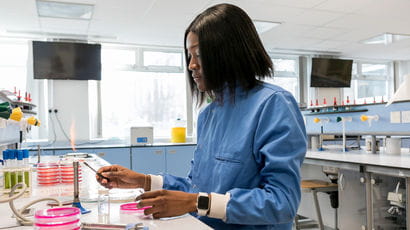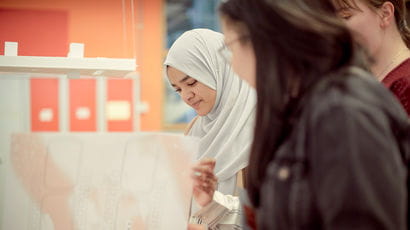The Effect of Light Regime on Nitrogen Metabolism and Contaminant Uptake By Plants Grown In Hydroponics
Introduction
An exciting opportunity to apply for a fully funded PhD positions in the College of Health, Science and Society, UWE Bristol.
Ref: 2324-JAN-HSS01
The expected start date of these studentships is 1 January 2024.
The closing date for applications is 15 September 2023.
Studentship details
About the project
This project will contribute to a European Innovation Council (EIC) project entitled ‘Microbial Hydroponics (Mi-Hy)’, which is developing hydroponic systems driven by Microbial Fuel Cells (MFCs) for urban farming. This studentship will contribute by researching the interaction between light regime and nitrogen metabolism in hydroponic systems in order to aid the development of Mi-Hy’s hydroponic system. Further, it will use the hydroponic system established by Mi-Hy to investigate the uptake of contaminants into the food crops.
About the research
Hydroponic systems of various sorts make a significant contribution to food production, but they are often unsustainable. The Mi-Hy project aims to develop more sustainable hydroponic systems driven by MFCs fed with urban wastes. Key determining factors for plant production are light use and nitrogen metabolism but the effects of MFC driven provision of them on plants is unknown and will be the focus of the research in this studentship. Further, the effects of growing plants in this way on the uptake of contaminants is unknown and will provide another opportunity for research in this studentship.
Background
Hydroponic plant production systems are evolving rapidly because of the contribution that they can make to sustainable food production. A key aspect of hydroponic system development is efficient matching of the provision of light and nitrogen to the requirements for plant metabolism because the energy needed for light and nitrogen production can be high and environmentally costly. UWE is an associate partner of a European Innovation Council (EIC) funded project ‘Microbial Hydroponics (Mi-Hy)’ investigating the potential of Microbial Fuel Cells to drive hydroponic systems, a key part of which is investigation of light regime and nitrogen uptake in hydroponics. If plant metabolic demands for light and nitrogen can be matched to outputs from MFCs being fed wastes, then hydroponic systems with a much-reduced environmental footprint might be possible. Further, light regimes and their effects on nitrogen metabolism also affect the uptake of contaminants by plants. This studentship is an opportunity to contribute to understanding light and nitrogen regimes in hydroponics powered by MFCs, and to understand the effects on the uptake by plants of cationic and anionic contaminants.
Cs-137 is the radioactive contaminant most frequently of concern in the environment because, like its analogue cation K, it is highly soluble and readily taken up by living organisms. The protection of humans from contamination with Cs-137 via the foodchain depends on understanding the transfer of Cs-137 from soils to plants. Compilations of soil to plant ‘Transfer Factors’ are available for models of food chain contamination but the effects of light regime and nitrogen metabolism on Cs-137 transfer into plants are not understood. Some effects of light regime on K uptake are known but not those on Cs-137 uptake. There are several reports that ‘ammonium-fed’ plants take up Cs-137 more rapidly than ‘nitrate-fed’ plants but these effects are little explored. Tc-99 is a significant component of existing nuclear waste and, due to decay of other radionuclides, will for a significant period in the future be its predominant radionuclide. The ions that Tc-99 forms in aqueous solution are dependent on redox potential, and it is usually suggested that the pertechnetate anion (TcO4-) formed in oxidative conditions contaminates plants via the nitrate (NO3-) uptake system. This studentship can help to elucidate the interaction between light regime and nitrogen metabolism in hydroponics and use this to investigate effects on the uptake of the contaminants Cs-137 and Tc-99.
Aims and objectives
The primary aim of this PhD will be to match light and nitrogen regimes required by plants grown in hydroponics to those that MFCs can provide and to determine the effects of these regimes on the uptake of contaminant cations and anions. The first objective will be to work with the Mi-Hy project to optimise light and nitrogen regimes in MFC-powered hydroponics. The second objective will be to use the optimised hydroponic system to investigate the uptake of contaminants, e.g. Cs-137 and Tc-99.
Methods
Hydroponics. Nutrient film-based hydroponic systems will be used in controlled environment chambers in which temperate, light and humidity can be controlled. A system that can be scaled-up and that can interface with MFCs will be used.
Light Regimes. LED-based light systems will be developed for plant growth in hydroponics. These will be developed, in conjunction with My-Hi to provide, using variable spectrum LEDs, light regimes that vary in intensity and quality.
Nitrogen Analyses. The nitrogen status will be measured using chlorophyll as a proxy and the dynamics of nitrogen metabolites will be measured using stable and radioactive isotopes.
Contaminant Analyses. The uptake of Cs-137 will be traced using gamma spectroscopy and the uptake of Tc-99 using beta-counting.
Intended contributions
This studentship should enable the holder to advance our understanding of plant metabolism in hydroponics and the effects of using MFCs to drive it. It will also enable the holder to contribute significantly to the understanding of the uptake of some key contaminants by plants, with implications not just for hydroponics but for all food production systems. This will make a key contribution to the Mi-Hy project which aims to provide MFC-driven hydroponic systems for urban developments. The Mi-Hy project is co-ordinated by the Department of Architecture at KU Leuven in Belgium. Researchers at Southampton, CISC in Madrid and at UWE will develop, respectively, MFCs and hydroponic systems with control systems developed at Sony AI labs in Paris. These will be interfaced with urban development and technology transfer projects by researchers at KU Leuven and Biofaction in Vienna.
For further information or to discuss the project informally please contact Neil Willey at Neil.Willey@uwe.ac.uk.
Funding
The studentship is available from 1 January 2024 for a period of three and half years, subject to satisfactory progress and includes a tax exempt stipend, which is currently £18,622 per annum(23/24).
In addition, full-time tuition fees will be covered for up to three years.
Eligibility
The project offers significant opportunities for experience in the area of hydroponics, urban farming and plant physiology.
The successful candidate will have at least a 2:1 BSc (Hons) in a relevant scientific discipline.
A Masters qualification and research experience relevant to the project is desirable.
The successful candidate will be based in the Centre for Research in Biosciences at UWE but will need to liaise with, and may occasionally travel to, Mi-Hy project partners in Southampton, Leuven, Madrid, Paris and Vienna.
A recognised English language qualification is required.
How to apply
Please submit your application online. When prompted use the reference number 2324-JAN-HSS01.
Supporting documentation: You will need to upload your research proposal, all your degree certificates and transcripts and your proof of English language proficiency as attachments to your application, so please have these available when you complete the application form.
References: You will need to provide details of two referees as part of your application. At least one referee must be an academic referee from the institution that conferred your highest degree. Your referee will be asked for a reference at the time you submit your application, so please ensure that your nominated referees are willing and able to provide references within 14 days of your application being submitted.
Closing date
The closing date for applications is 15 September 2023.
Further information
It is expected that interviews will take place in January 2023. If you have not heard from us by February, we thank you for your application but on this occasion you have not been successful.
You may also be interested in

Contact the Doctoral Academy
Ways to contact the Doctoral Academy, from postgraduate research support to submitting your thesis.

Fees and funding
View Doctoral Academy tuition fees, project fees, completion fees and resubmission fees.

About the Doctoral Academy
Find out more about the UWE Bristol Doctoral Academy.

Research
Discover how research at UWE Bristol is making a real impact.
